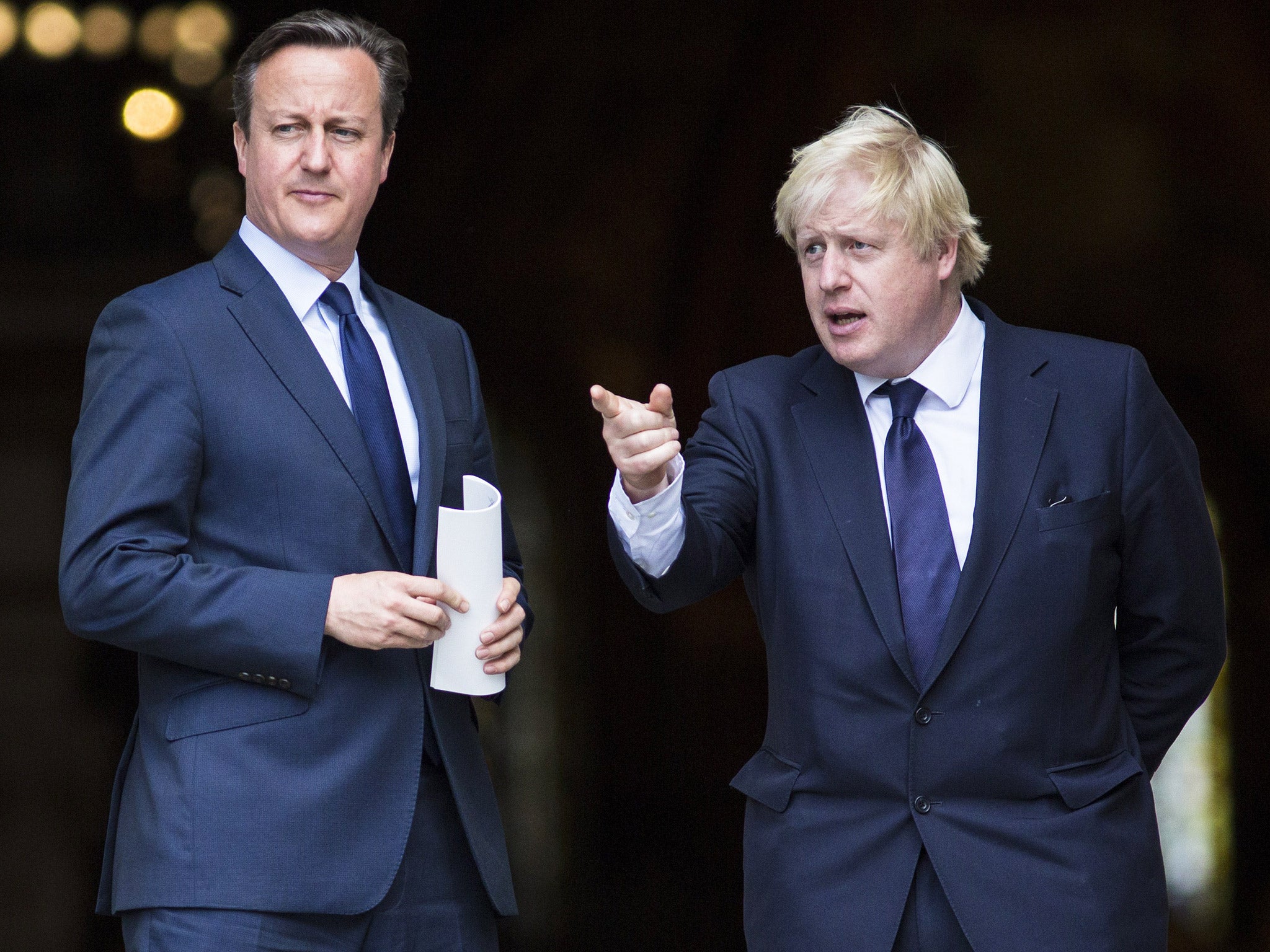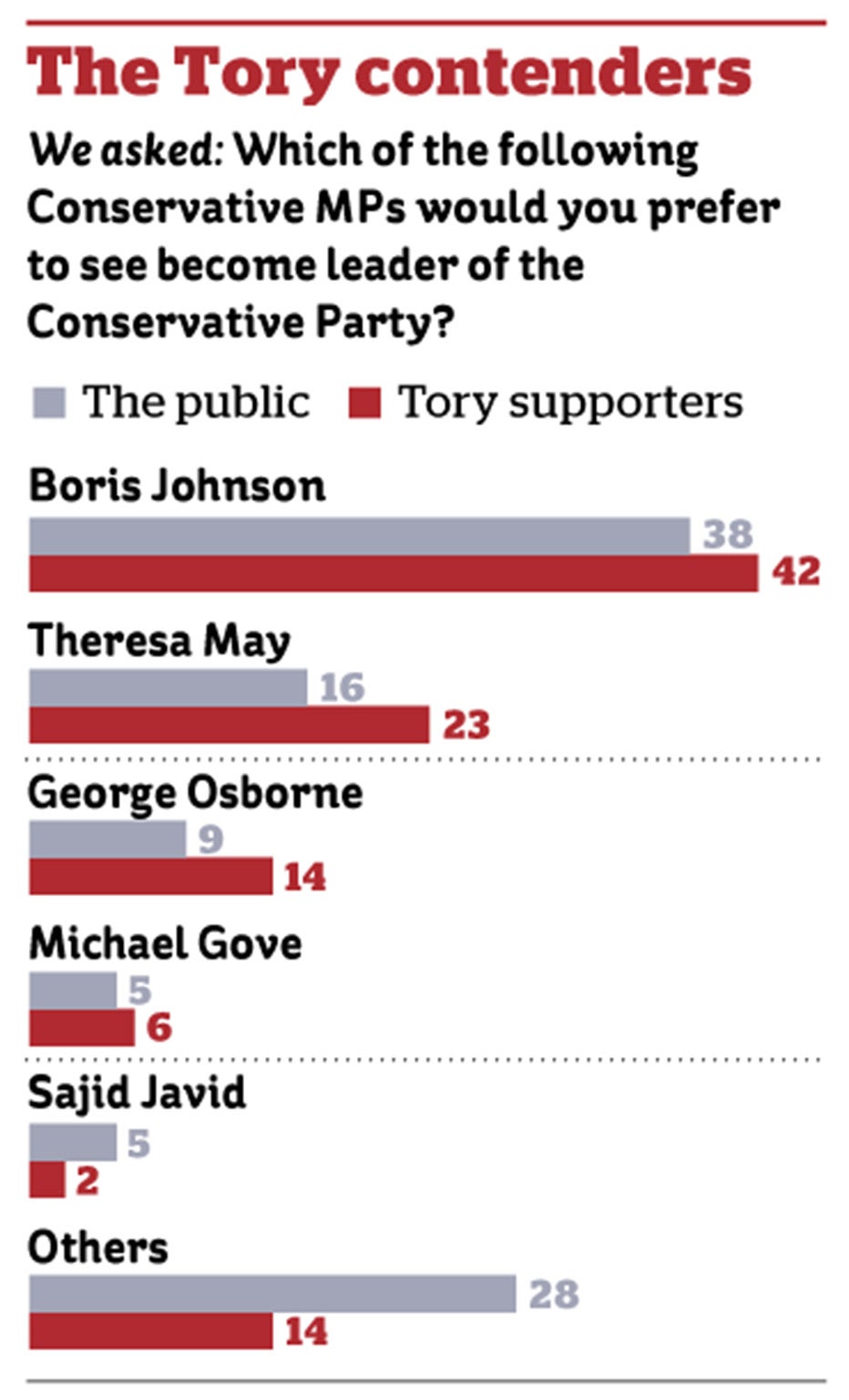Boris Johnson favourite to succeed David Cameron as Tory leader, as George Osborne slips into third place
Exclusive: Poll for The Independent shows more than a third of voters want the Mayor of London to take over from David Cameron in 2020

Your support helps us to tell the story
From reproductive rights to climate change to Big Tech, The Independent is on the ground when the story is developing. Whether it's investigating the financials of Elon Musk's pro-Trump PAC or producing our latest documentary, 'The A Word', which shines a light on the American women fighting for reproductive rights, we know how important it is to parse out the facts from the messaging.
At such a critical moment in US history, we need reporters on the ground. Your donation allows us to keep sending journalists to speak to both sides of the story.
The Independent is trusted by Americans across the entire political spectrum. And unlike many other quality news outlets, we choose not to lock Americans out of our reporting and analysis with paywalls. We believe quality journalism should be available to everyone, paid for by those who can afford it.
Your support makes all the difference.Boris Johnson is the clear favourite among both the public and Conservative voters to succeed David Cameron, according to a survey for The Independent.
ORB found that 38 per cent of people want the Mayor of London to take over as Tory leader from Mr Cameron, who has said he will step down before the 2020 general election. Theresa May, the Home Secretary, is favoured by 16 per cent, pushing George Osborne, the Chancellor, into third place on 9 per cent.
Among those who voted Tory at last year’s election, 42 per cent would like to see Mr Johnson succeed Mr Cameron, with 23 per cent backing Mrs May and just 14 per cent Mr Osborne. There is growing concern among Tories who oppose Mr Johnson that he is likely to win the Tory leadership after coming out against Britain’s membership of the EU. The final decision rests with the party’s 150,000 members.

The survey of 2,000 people suggests the Chancellor has suffered a backlash from his trouble-hit Budget this month. He was forced to make a swift U-turn over £4.4bn in cuts to disability benefits after the resignation of Iain Duncan Smith as Work and Pensions Secretary.
Only 28 per cent of people agree that Mr Osborne “is doing a good job in managing the UK economy”, while twice as many (57 per cent) disagree with this statement. However, the Chancellor has not lost the confidence of Tory supporters; 56 per cent of them believe he is doing a good job, while 29 per cent do not.
There is overwhelming public opposition to further cuts in welfare, according to ORB. The idea is opposed by seven out of 10 people (69 per cent). Only one in five people (20 per cent) disagrees.
The finding comes after ministers said they had no plans for a further raid on the welfare budget after dropping controversial proposals to cut Personal Independent Payments (PIPs) for the disabled. Mr Osborne hopes the £4.4bn “black hole” in his spending plans will be filled by the higher tax receipts that economic growth would generate. But he has not entirely ruled out looking again for welfare savings if that does not materialise.
In a sign that the appetite for austerity measures may be waning, 50 per cent of Conservative supporters oppose more welfare cuts while only 36 per cent disagree. Further cuts are opposed by 84 per cent of Labour voters and 71 per cent of Liberal Democrat voters. The figures suggest that the Government may have to look elsewhere for savings if its sums do not add up – or abandon Mr Osborne’s plan to run a £10bn surplus by the 2020 general election.
Public opinion on Europe has shifted in favour of continued membership in the past month, according to ORB. Some 51 per cent of people say that the UK should remain a member of the EU, while 49 per cent want to leave it. Last month ORB found that 52 per cent wanted to withdraw from the EU and 48 per cent to stay.
The latest survey found that women (53 per cent) are more likely to support remaining in the EU than men (49 per cent). A majority of men (51 per cent) back leaving. So do a majority of Tory voters (56 per cent).
There is a stark generation gap, with EU membership supported by 77 per cent of 18-24 year-olds but only 40 per cent of those aged 65 and over. In campaigners admit they face a huge challenge in persuading young adults to vote in the June referendum. Older voters are much more likely to turn out at general elections and so a differential turnout in June could decide the outcome.
The result appears on a knife edge. Despite the narrow lead for the In camp, more people (44 per cent) say they have felt more inclined to vote to leave the EU in the past seven days than those who feel more inclined to vote to remain (40 per cent).
Support for membership is highest in Scotland (62 per cent) and London (56 per cent) but lowest in the Eastern region, where 40 per cent want to remain and 60 per cent to leave.
Four out of five people (81 per cent) agree that the terrorist attacks in Brussels highlight the need for EU nations to stand together against terrorism, while only 10 per cent disagree.
Join our commenting forum
Join thought-provoking conversations, follow other Independent readers and see their replies
Comments